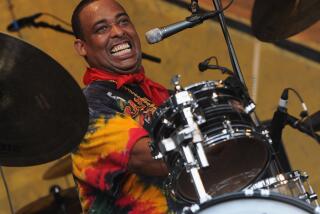B. Olatunji, 75; He Showed Power of African Music
- Share via
Babatunde Olatunji, a Nigerian drummer whose decades of groundbreaking work were rooted in his native culture and influenced countless musicians, has died. He was 75.
Olatunji died Sunday morning at Salinas Valley Memorial Hospital, according to nursing supervisor Lori White. Olatunji, who had been admitted March 25, lived at the nearby Esalen Institute in Big Sur.
Though the cause of death was not released, Olatunji’s daughter told the New York Times he died of complications from diabetes.
His 1959 release “Drums of Passion” was the first album of African drumming recorded in stereo in an American studio. It introduced a generation to the power and intricacy of African music, said a longtime San Francisco-based critic of world music, J. Poet.
“He planted a seed that gave birth to the whole interest in African music in the United States,” Poet said. “Before him, the drum was always kind of mixed into the background. After Olatunji, the drum just really came blasting out at you.”
Olatunji’s deft slaps on the djembe and junjun drums infused American black culture with a sense of pride in traditional African music, Poet said.
Olatunji went on to found the Center for African Culture, based in Harlem, New York City, in the late 1960s. He taught drummers and other artists seeking to add breadth to their music knowledge.
Olatunji was one of the founding members of Grateful Dead drummer Mickey Hart’s Grammy Award-winning Planet Drum percussion troupe. Hart credits the Nigerian as a major influence.
“We spoke the same language,” Hart said. “It was about rhythm -- the drums -- and he was the godfather of this whole movement of communal drumming.”
Hart recalled Olatunji’s commanding voice and rhythms as the base for his popularity. Hart said the feeling he got from first hearing Olatunji’s music has stayed with him.
“ ‘Drums of Passion’ combined drums, vocals and then brass -- the hot syncopation of New York City. He was an American by then,” Hart recalled. “From the moment I heard it in 1959, I’ve been chasing that feeling for 40 years.”
Olatunji was born in Ajido, a fishing and trading village. His band of drummers, singers and dancers evoked the village’s music and its masquerades, with figures dancing in elaborate costumes.
Olatunji studied at New York University and soon formed an African-style ensemble that became his full-time occupation.
His most recent album, “Love Drum Talk,” was released in 1997 and was nominated for a Grammy Award.
Olatunji is survived by his wife, Amy; two sons; two daughters; a brother; and seven grandchildren.
More to Read
The biggest entertainment stories
Get our big stories about Hollywood, film, television, music, arts, culture and more right in your inbox as soon as they publish.
You may occasionally receive promotional content from the Los Angeles Times.










